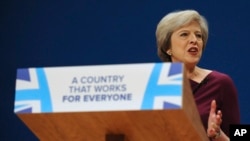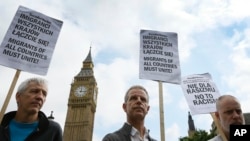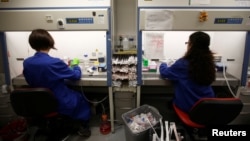Britain’s ruling Conservative party was once seen as the party of business, but Tory government ministers and business leaders are now clashing over post-Brexit immigration curbs outlined in a series of hard-line speeches at the party's annual conference this week in Birmingham.
Prime Minister Theresa May and her ministers stressed repeatedly in speeches that they won’t compromise on migration controls in order to secure a free trade deal with the European Union, the world's largest trading bloc.
That is alarming business people and investors, who fear the economic consequences of a so-called “hard Brexit,” a departure from the European Union that would see Britain outside Europe’s single market and its exports to the continent facing high, and competitive-blunting, tariffs. May’s position is that economic losses are a price worth paying for immigration controls on Europeans and non-Europeans alike.
Business leaders also are upset about government plans for an immediate, highly restrictive approach to immigration that would see curbs on employers hiring foreign workers, tightening tests on companies that want to recruit overseas and requiring firms to publish details of foreigners on their staffs in what is being seen as a “naming and shaming” exercise.
Keeping jobs for Britons
In a notably uncompromising speech Tuesday, Interior Minister Amber Rudd said, “The [visa] test should ensure people coming here are filling gaps in the labor market, not taking jobs British people could do.”
The tougher rules would apply to Europeans when Britain formally leaves the bloc after 46 years of membership, but will be put into effect soon for non-Europeans. Prime Minister May plans to trigger Article 50 of the Lisbon Treaty, the legal mechanism for leaving the European Union, by the end of March. This step would mean Britain will likely break with the European bloc no later than April 2019.
“Businesses will not welcome further restrictions on high-skilled migration from key trading partners around the world,” warned Josh Hardie, deputy director-general of the Confederation of British Industry.
Business leaders say Conservative ministers are pandering to economic populism by blaming firms for hiring foreigners to do jobs Britons could do, and they accuse the new crop of Tory leaders of shunning the legacy of the legendary Tory Prime Minister Margaret Thatcher.
Her philosophy emphasized limited government, free markets and entrepreneurship. “Government had no business being in business,” she once said, arguing entrepreneurs should have the freedom to grow their companies without political interference.
Seamus Nevin of the Institute of Directors, a business lobby group, said in a statement, “The evidence is clear that migrants are a benefit to the economy.” He warned immigration would “be a major bone of contention between companies and this government.” European migrants in Britain are a net contributor to the national budget, say economists.
The anti-immigrant tone seamed a number of other ministerial speeches this week in Birmingham, the Midlands city where 10 percent of the population was born overseas. David Davis, the so-called Brexit minister tasked with overseeing Britain’s EU withdrawal, said British workers would be put first after the country leaves the European bloc.
Boosting education for Britons
Health Minister Jeremy Hunt announced plans to increase the number of Britons to train as doctors, reducing the need for non-British doctors. And the government has refused to commit to allowing foreign-born doctors already in Britain to stay, once enough native British recruits have completed medical training.
Universities will also be targeted in the government’s effort to reduce immigrant numbers to tens of thousands annually, as a large number of foreign students stays on after finishing their studies. From March 2015 to March 2016, Britain saw a near-record 327,000 migrants settling in the country.
Interior Minister Rudd plans to tighten visa rules for students from overseas with the quality of courses and educational institutions being taken into account.
Britain has already made visa regulations tougher for foreign students. University chancellors say more restrictions will make it harder for them to recruit international students. The number of international students last year dropped 15 percent. Universities UK, a higher education lobbying group, says non-EU students contribute $9 billion to the British economy, generating almost 137,000 jobs.
Government ministers are adamant they are responding to public concerns about high immigration. They say the Brexit referendum in June made clear the public wants to see a massive reduction in migrant numbers. Commentators argue the push to reduce immigration is part of May’s effort to attract working class Labor Party supporters, a large proportion of whom voted for Britain to leave the European Union.
On Tuesday, Guy Verhofstadt, who will represent the European Parliament in Brexit talks, warned Britain could not expect tariff-free access to the EU single market without accepting free movement for European migrants. Curbing free movement would mean “you destroy, in fact, the union and the internal market,” he said.
Ministers dismiss concerns about Brexit-related economic turbulence and point to an International Monetary Fund report this week that said economically, Britain is growing faster than any other nation in the Group of Seven leading industrialized countries. But the International Monetary Fund has reduced British growth projections for 2017 and the year after.






